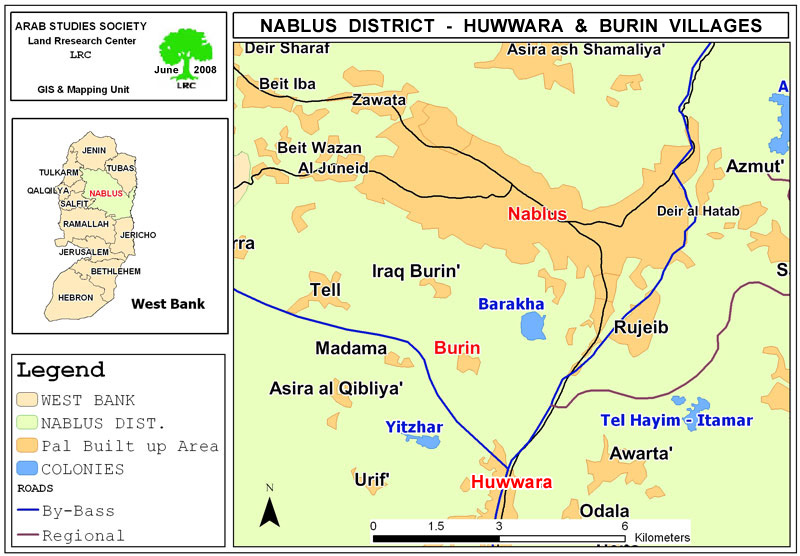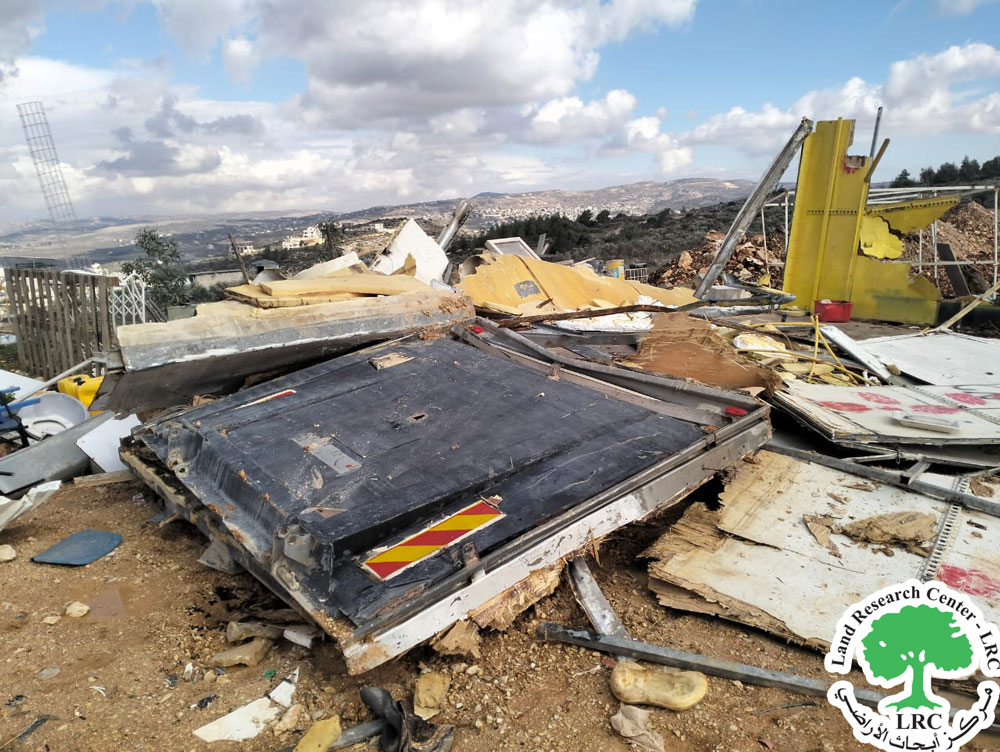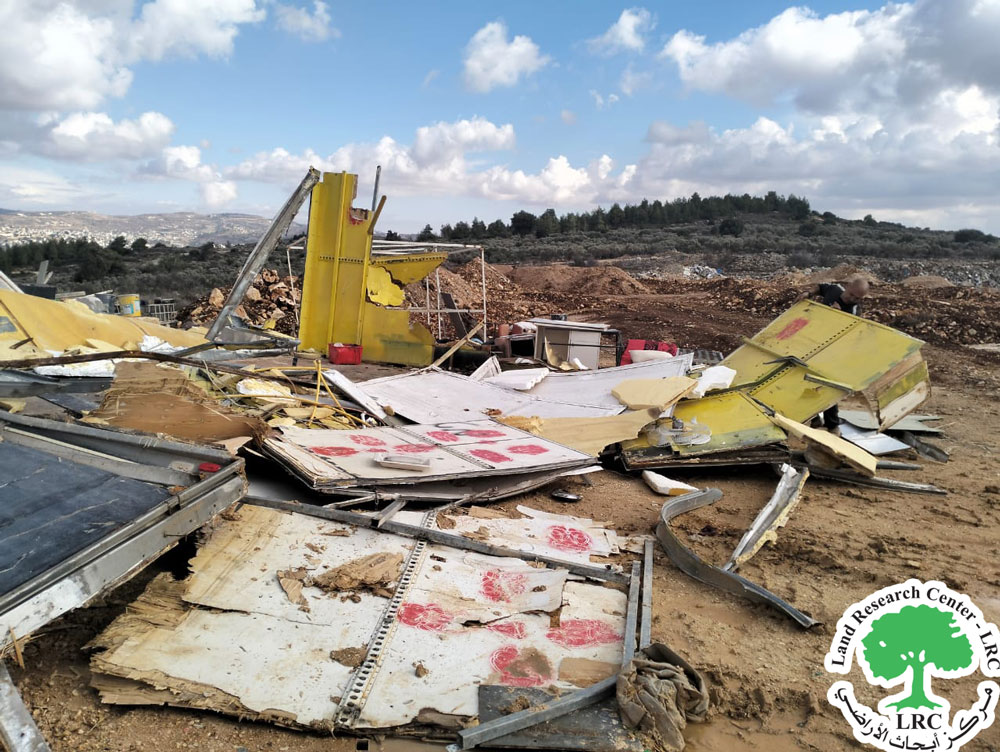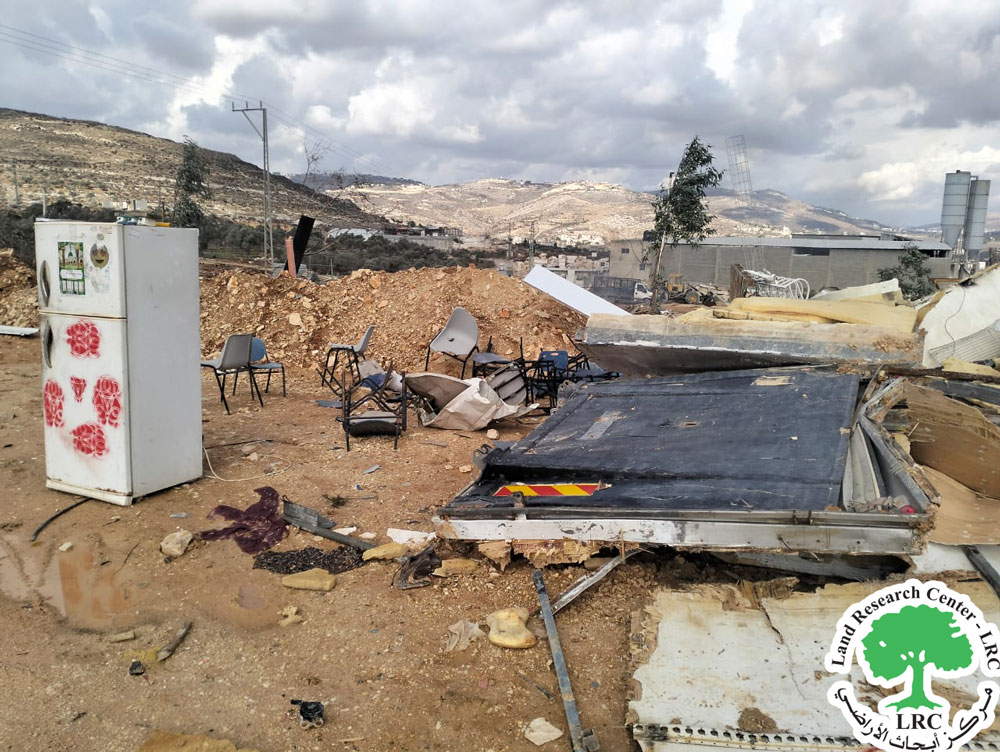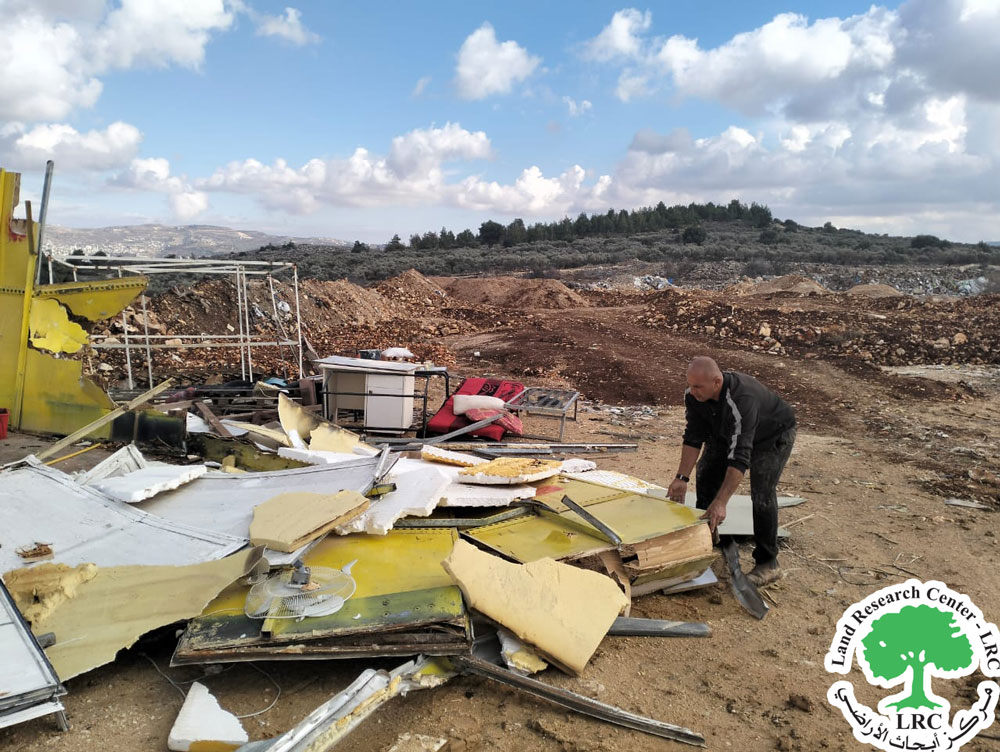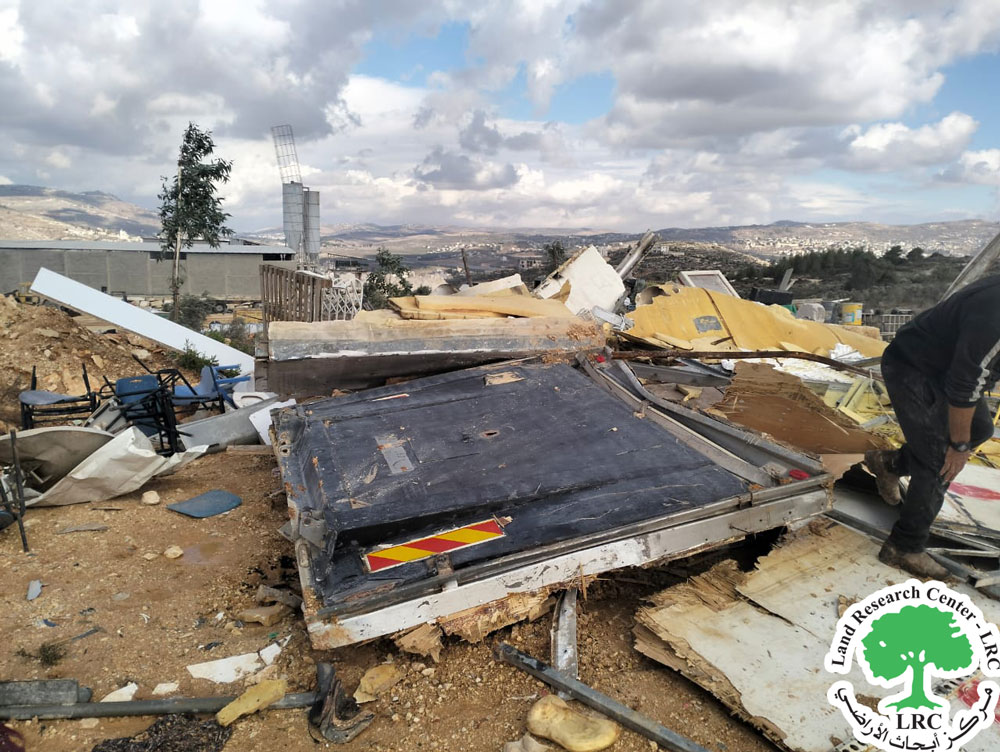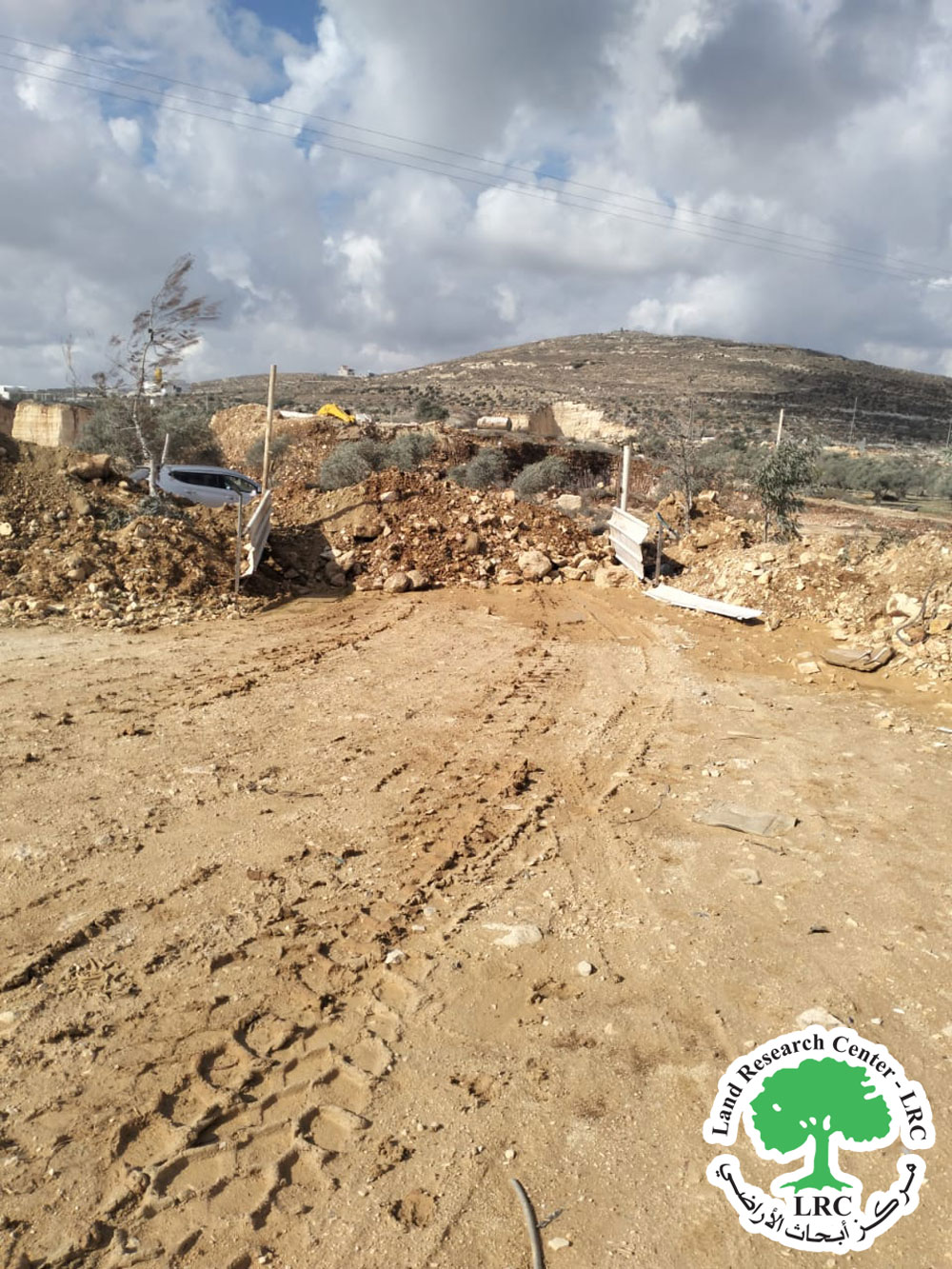The Israeli occupation demolishes a metal room and an agricultural shed in the town of Hawara / Nablus Governorate
Violation: Demolition of a metal room and an agricultural shed.
Location: Hawara town, south of Nablus city.
Date of violation: 18/11/2024.
Perpetrator: The so-called building inspector of the Israeli Civil Administration.
Victim: Farmer Abdul Rahim Hafiz Aqila "Mohammad Salama".
Description:
On the afternoon of Monday, November 18, 2024, the so-called building inspector of the Israeli Civil Administration raided the town of Hawara, located east of Nablus city, targeting agricultural land owned by farmer Abdul Rahim Hafiz Aqila "Mohammad Salama" from Hawara town.
The occupation carried out the demolition operation using a civilian bulldozer that accompanied them, and the demolition targeted the following:
- The demolition of an agricultural room, a mobile metal unit ("caravan") with an area of 28m², which was used as a rest area.
- The demolition of a zinc canopy, made of iron columns with a zinc roof, used to store agricultural tools, covering an area of 32m².
- The closure of the road leading to the entrance of the land, which covers an area of 2 dunams and is in the process of being prepared for cultivation.
It is worth mentioning that the impacted farmer is the breadwinner of a family of 11 members, including 8 children and 7 females within the household.
The impacted farmer informed the researcher at the Land Research Center as follows:
"I own a piece of agricultural land located to the west of the town of Hawara, on the road connecting to the town of Jama'in. I started, three months ago, to rehabilitate the land with the intention of cultivating it, and its total area is 2 dunams. One month ago, I placed a metal room on my land and built an agricultural shed, which is a canopy with iron columns, where I stored the agricultural equipment in preparation for planting. A week ago, I received demolition orders – immediate demolition within 96 hours. At that time, I went to the municipality in Hawara and contacted the Wall and Settlement Resistance Commission. Before I could complete the paperwork, I was surprised to find the occupation's machinery on my land. They demolished the shed and the caravan and also closed the entrance to the land with dirt barriers. I wonder about the purpose of the demolition, knowing that there are no settlements or bypass roads in the area of the demolition."
It is worth mentioning that over the past two years, the town of Hawara has witnessed repeated demolitions, including a number of commercial stores as well as residential and agricultural structures near the bypass road number 60, which cuts through parts of the town and divides it into two sections.
Overview of Hawara Town:[1]
Hawara town is located 8 kilometers south of Nablus city, on bypass road number 60, which connects the northern and southern West Bank. This road has come to be known as the "Street of Death" due to the frequent daily accidents involving vehicles, including hit-and-runs and collisions. The Hawara municipality has repeatedly attempted to maintain the road and put up warning signs, but the Israeli occupation impedes the maintenance process and refuses to allow even basic traffic signs.
The population of Hawara town is 6,659 as of 2017, divided into three main families: Awda, Dumeidi, and Khamos. Additionally, 3% of the town’s population are refugees.
The total area of Hawara town is 8,520 dunams, of which 1,116 dunams are designated for building purposes. On the village's land, the Israeli settlement "Yitzhar" has confiscated 331 dunams, while bypass road number 60 has seized 430 dunams of its land.
Agricultural Rooms in the Israeli Targeting Circle:
The Israeli army and settlers target the agricultural rooms built by Palestinian farmers on their land to store agricultural tools used for maintaining their land. These rooms are also used by farmers as resting places after the exhaustion of carrying out agricultural operations (plowing, irrigating crops, weeding, spraying pesticides, etc.). The occupation and its settlers aim through these attacks to deter the Palestinian farmer from accessing his land, instilling fear by suggesting that reaching the land would put his life in danger, thus preventing the farmer from accessing his land safely.
The Land Research Center has documented the demolition of 302 agricultural facilities since the beginning of the war on the Gaza Strip until the date of this report, including 54 agricultural rooms. Additionally, settlers have attacked, burned, vandalized, or destroyed 446 agricultural properties, including 106 agricultural rooms.
Therefore, the Israeli army and settlers exchange roles in attacking agricultural facilities and land to make these areas empty, instilling fear in Palestinians about reaching them, thus preserving these lands as a colonial reserve.
[1] Source: LRC
مشروع: حماية الحقوق البيئية الفلسطينية في مناطق "ج" SPERAC IV - FCDO
Disclaimer: The views and opinions expressed in this report are those of Land Research Center and do not necessarily reflect the views or positions of the project donor; the Norwegian Refugee Council.
إخلاء المسؤولية: الآراء ووجهات النظر الواردة في هذا التقرير هي آراء ووجهات نظر مركز أبحاث الأراضي ولا تعكس بالضرورة وجهات نظر أو مواقف الجهة المانحة للمشروع؛ المجلس النرويجي. للاجئين
